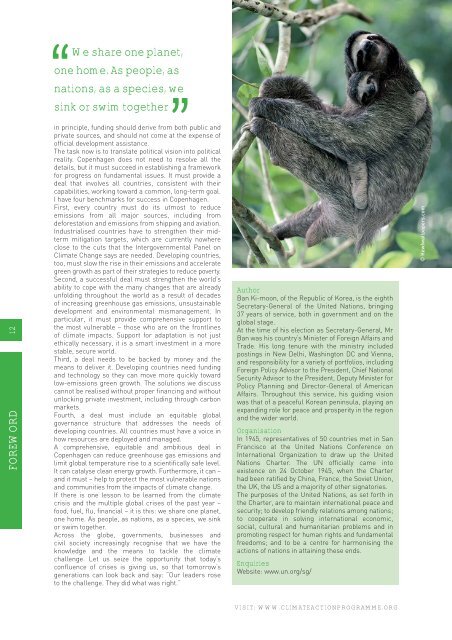Climate Action 2009-2010
Create successful ePaper yourself
Turn your PDF publications into a flip-book with our unique Google optimized e-Paper software.
“<br />
We share one planet,<br />
one home. As people, as<br />
nations, as a species, we<br />
sink or swim together<br />
“<br />
FOREWORD 12<br />
in principle, funding should derive from both public and<br />
private sources, and should not come at the expense of<br />
official development assistance.<br />
The task now is to translate political vision into political<br />
reality. Copenhagen does not need to resolve all the<br />
details, but it must succeed in establishing a framework<br />
for progress on fundamental issues. It must provide a<br />
deal that involves all countries, consistent with their<br />
capabilities, working toward a common, long-term goal.<br />
I have four benchmarks for success in Copenhagen.<br />
First, every country must do its utmost to reduce<br />
emissions from all major sources, including from<br />
deforestation and emissions from shipping and aviation.<br />
Industrialised countries have to strengthen their midterm<br />
mitigation targets, which are currently nowhere<br />
close to the cuts that the Intergovernmental Panel on<br />
<strong>Climate</strong> Change says are needed. Developing countries,<br />
too, must slow the rise in their emissions and accelerate<br />
green growth as part of their strategies to reduce poverty.<br />
Second, a successful deal must strengthen the world’s<br />
ability to cope with the many changes that are already<br />
unfolding throughout the world as a result of decades<br />
of increasing greenhouse gas emissions, unsustainable<br />
development and environmental mismanagement. In<br />
particular, it must provide comprehensive support to<br />
the most vulnerable – those who are on the frontlines<br />
of climate impacts. Support for adaptation is not just<br />
ethically necessary, it is a smart investment in a more<br />
stable, secure world.<br />
Third, a deal needs to be backed by money and the<br />
means to deliver it. Developing countries need funding<br />
and technology so they can move more quickly toward<br />
low-emissions green growth. The solutions we discuss<br />
cannot be realised without proper financing and without<br />
unlocking private investment, including through carbon<br />
markets.<br />
Fourth, a deal must include an equitable global<br />
governance structure that addresses the needs of<br />
developing countries. All countries must have a voice in<br />
how resources are deployed and managed.<br />
A comprehensive, equitable and ambitious deal in<br />
Copenhagen can reduce greenhouse gas emissions and<br />
limit global temperature rise to a scientifically safe level.<br />
It can catalyse clean energy growth. Furthermore, it can –<br />
and it must – help to protect the most vulnerable nations<br />
and communities from the impacts of climate change.<br />
If there is one lesson to be learned from the climate<br />
crisis and the multiple global crises of the past year –<br />
food, fuel, flu, financial – it is this: we share one planet,<br />
one home. As people, as nations, as a species, we sink<br />
or swim together.<br />
Across the globe, governments, businesses and<br />
civil society increasingly recognise that we have the<br />
knowledge and the means to tackle the climate<br />
challenge. Let us seize the opportunity that today’s<br />
confluence of crises is giving us, so that tomorrow’s<br />
generations can look back and say: “Our leaders rose<br />
to the challenge. They did what was right.”<br />
Author<br />
Ban Ki-moon, of the Republic of Korea, is the eighth<br />
Secretary-General of the United Nations, bringing<br />
37 years of service, both in government and on the<br />
global stage.<br />
At the time of his election as Secretary-General, Mr<br />
Ban was his country’s Minister of Foreign Affairs and<br />
Trade. His long tenure with the ministry included<br />
postings in New Delhi, Washington DC and Vienna,<br />
and responsibility for a variety of portfolios, including<br />
Foreign Policy Advisor to the President, Chief National<br />
Security Advisor to the President, Deputy Minister for<br />
Policy Planning and Director-General of American<br />
Affairs. Throughout this service, his guiding vision<br />
was that of a peaceful Korean peninsula, playing an<br />
expanding role for peace and prosperity in the region<br />
and the wider world.<br />
Organisation<br />
In 1945, representatives of 50 countries met in San<br />
Francisco at the United Nations Conference on<br />
International Organization to draw up the United<br />
Nations Charter. The UN officially came into<br />
existence on 24 October 1945, when the Charter<br />
had been ratified by China, France, the Soviet Union,<br />
the UK, the US and a majority of other signatories.<br />
The purposes of the United Nations, as set forth in<br />
the Charter, are to maintain international peace and<br />
security; to develop friendly relations among nations;<br />
to cooperate in solving international economic,<br />
social, cultural and humanitarian problems and in<br />
promoting respect for human rights and fundamental<br />
freedoms; and to be a centre for harmonising the<br />
actions of nations in attaining these ends.<br />
Enquiries<br />
Website: www.un.org/sg/<br />
© Kewlwallpapers.com<br />
VISIT: WWW.CLIMATEACTIONPROGRAMME.ORG












